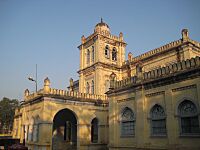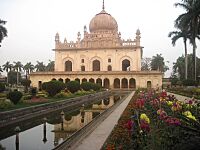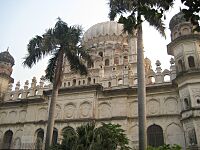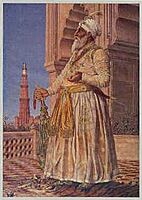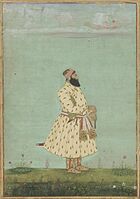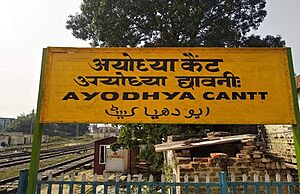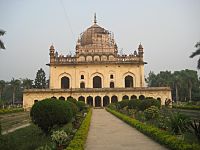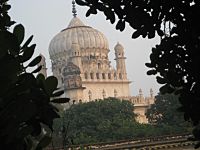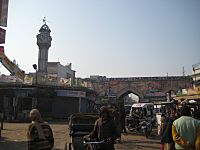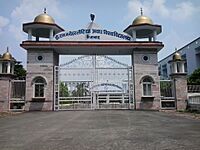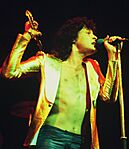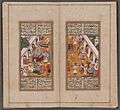Faizabad facts for kids
Quick facts for kids
Faizabad
|
|
|---|---|
|
City
|
|
|
Tilak Hall, Gulab Bari, Bahu Begum ka Maqbara
|
|
| Country | |
| State | Uttar Pradesh |
| Division | Ayodhya |
| District | Ayodhya |
| Government | |
| • Type | Municipal corporation |
| • Body | Ayodhya Municipal Corporation |
| Area | |
| • Total | 16.02 km2 (6.19 sq mi) |
| Elevation | 97 m (318 ft) |
| Population | |
| • Total | 165,228 |
| • Density | 10,314/km2 (26,713/sq mi) |
| Language | |
| • Official | Hindi |
| • Additional official | Urdu |
| • Regional | Awadhi |
| Time zone | UTC+5:30 (IST) |
| PIN |
224001
|
| Telephone code | +91-5278 |
| Vehicle registration | UP-42 |
| Sex ratio | 998/1000 ♂/♀ |
Faizabad is a city in the Uttar Pradesh state of India. It sits on the southern bank of the River Saryu. The city is about 6.5 kilometers from Ayodhya City, which is the district's main office. It is also 130 kilometers east of Lucknow, the state capital.
Faizabad was once the first capital of the Nawabs of Awadh. These rulers built famous buildings like the Tomb of Bahu Begum and Gulab Bari. Until November 2018, Faizabad was also the main city for the Faizabad district and division. Today, Faizabad is a twin city of Ayodhya. Both are managed by the Ayodhya Municipal Corporation.
Contents
History of Faizabad
Faizabad's story began in 1730. That's when Saadat Ali Khan I, who was the governor of Oudh, built a hunting lodge. This lodge was about 4 miles west of Ayodhya. Soon, gardens were planted and shops appeared nearby.
Later, during the time of Safdarjung, the name Faizabad was first used. Shuja-ud-Daula, the third Nawab, lived mostly in Lucknow at first. But after losing a battle in 1764, he moved to Faizabad. He added many defenses and built a large town.
Shuja-ud-Daula passed away in 1775. After that, Asaf-ud-Daula moved the capital to Lucknow. Faizabad became less important. However, it remained home to Asaf-ud-Daula's grandmother and mother, the Nawab Begam and Bahu Begam. After Bahu Begam died in 1816, Faizabad continued to decline. The British took over Oudh State in 1856. In 1865, Ayodhya and Faizabad began to be governed together as one municipality.
Awadh's Royal Beginnings
Gulab Bari is a beautiful garden with a wall around it. It has two large gates. The buildings here show a mix of different building styles.
Shuja-ud-Daula's wife was Bahu Begum. She married the Nawab in 1743 and lived in Faizabad. Her home was called Moti-Mahal. Nearby, in Jawaharbagh, is her tomb, called a Maqbara. She was buried there after her death in 1816. This tomb is one of the most beautiful buildings in Awadh. It cost a lot of money to build. You can see a great view of the city from the top of her tomb. Bahu Begum was a very important and respected woman. Many Muslim buildings in Faizabad are linked to her.
After Bahu Begum died in 1815, Faizabad slowly started to lose its importance. The city's glory ended when Nawab Asaf-ud-daula moved the capital from Faizabad to Lucknow in 1775. This happened after he had disagreements with his mother.
Faizabad was also a place where battles happened during the Mutiny of 1857. You can read more about Faizabad's history in a book called 'Tareekh-e-Farahbaksh'. It was written by Munshi Mohd. Faiz Baksh, who worked for Shuja-ud-Daula. The city of Faizabad is named after him.
People of Faizabad (Demographics)
The 2011 Census of India collected information about Faizabad. It looked at the Faizabad municipal council and Faizabad Cantonment separately.
- The Faizabad municipal council had 165,228 people living in 28,150 homes.
- The Faizabad Cantonment had 12,391 people living in 2,014 homes.
In the Faizabad municipal council in 2011:
- There were 85,620 males and 79,608 females. This means there were about 930 females for every 1,000 males.
- There were 17,781 children aged six and under.
- About 84% of the people over six years old could read and write.
In the Faizabad Cantonment in 2011:
- There were 7,744 males and 4,647 females. This means there were about 600 females for every 1,000 males.
- There were 1,368 children aged six and under.
- About 89% of the people over six years old could read and write.
| Historical population of Faizabad (excluding the cantonment) | ||
|---|---|---|
| Year | Pop. | ±% |
| 1901 | 71,179 | — |
| 1911 | 54,655 | −23.2% |
| 1921 | 56,620 | +3.6% |
| 1931 | 59,992 | +6.0% |
| 1941 | 55,215 | −8.0% |
| 1951 | 76,582 | +38.7% |
| 1961 | 83,717 | +9.3% |
| 1971 | 102,835 | +22.8% |
| 1981 | 101,873 | −0.9% |
| 1991 | 124,437 | +22.1% |
| 2001 | 144,705 | +16.3% |
| 2011 | 165,228 | +14.2% |
| Historical population of Faizabad Cantonment | ||
|---|---|---|
| Year | Pop. | ±% |
| 1931 | 5,726 | — |
| 1941 | 2,417 | −57.8% |
| 1951 | 5,916 | +144.8% |
| 1961 | 4,579 | −22.6% |
| 1971 | 6,971 | +52.2% |
| 1981 | 10,794 | +54.8% |
| 1991 | 11,843 | +9.7% |
| 2001 | 14,040 | +18.6% |
| 2011 | 12,391 | −11.7% |
Faizabad's Climate and Weather
Faizabad has a climate like many places in central India. It has hot summers and mild winters. From March to July, summer temperatures can be very high, from 35 to 45 degrees Celsius (95 to 113 degrees Fahrenheit). In winter, from November to February, temperatures are much cooler, from 6 to 25 degrees Celsius (43 to 77 degrees Fahrenheit).
Most of the rain in Faizabad falls during the monsoon season. This is from June to September. About 85% of the yearly rainfall happens then. The average yearly rainfall is about 1100 millimeters (43 inches).
| Climate data for Faizabad (1971–2000, extremes 1959–2003) | |||||||||||||
|---|---|---|---|---|---|---|---|---|---|---|---|---|---|
| Month | Jan | Feb | Mar | Apr | May | Jun | Jul | Aug | Sep | Oct | Nov | Dec | Year |
| Record high °C (°F) | 28.5 (83.3) |
35.8 (96.4) |
41.7 (107.1) |
45.5 (113.9) |
46.0 (114.8) |
47.4 (117.3) |
41.6 (106.9) |
39.2 (102.6) |
37.8 (100.0) |
37.7 (99.9) |
35.8 (96.4) |
31.0 (87.8) |
47.4 (117.3) |
| Mean daily maximum °C (°F) | 22.6 (72.7) |
26.3 (79.3) |
32.0 (89.6) |
37.7 (99.9) |
39.4 (102.9) |
37.6 (99.7) |
33.6 (92.5) |
32.8 (91.0) |
32.8 (91.0) |
32.8 (91.0) |
29.6 (85.3) |
25.1 (77.2) |
31.9 (89.4) |
| Mean daily minimum °C (°F) | 7.4 (45.3) |
10.1 (50.2) |
14.3 (57.7) |
19.7 (67.5) |
23.7 (74.7) |
25.4 (77.7) |
25.0 (77.0) |
24.6 (76.3) |
23.3 (73.9) |
19.1 (66.4) |
12.6 (54.7) |
8.0 (46.4) |
17.7 (63.9) |
| Record low °C (°F) | 0.8 (33.4) |
1.8 (35.2) |
7.6 (45.7) |
11.4 (52.5) |
17.7 (63.9) |
16.4 (61.5) |
18.0 (64.4) |
18.2 (64.8) |
15.2 (59.4) |
7.4 (45.3) |
3.0 (37.4) |
1.0 (33.8) |
0.8 (33.4) |
| Average rainfall mm (inches) | 17.5 (0.69) |
14.4 (0.57) |
6.6 (0.26) |
8.3 (0.33) |
17.9 (0.70) |
141.0 (5.55) |
297.3 (11.70) |
324.9 (12.79) |
209.5 (8.25) |
51.4 (2.02) |
4.3 (0.17) |
9.5 (0.37) |
1,102.5 (43.41) |
| Average rainy days | 1.4 | 1.5 | 0.8 | 0.7 | 1.4 | 5.5 | 12.3 | 12.4 | 8.1 | 2.2 | 0.2 | 0.7 | 47.3 |
| Average relative humidity (%) (at 17:30 IST) | 64 | 59 | 45 | 39 | 42 | 56 | 75 | 79 | 77 | 73 | 69 | 67 | 62 |
| Source: India Meteorological Department | |||||||||||||
Getting Around Faizabad (Transport)
By Road
Faizabad is on National Highway 27. This means it's easy to reach other major cities by road. You can get to Kanpur (213 km), Lucknow (127 km), Varanasi (202 km), Prayagraj (161 km), and Gorakhpur (165 km). The state government runs regular buses to and from these cities.
Other important roads connect Faizabad to many places. NH330 goes to Prayagraj. Nawab Yusuf Road connects to Varanasi. There are also highways linking Faizabad to Raebareli, Gonda, Azamgarh, and Balrampur.
By Train
Faizabad has good train connections. The Indian Railways network links Faizabad directly to Kanpur, Lucknow, Varanasi, and Prayagraj.
Ayodhya Cantt railway station: This is a major railway station in Faizabad. In October 2021, its name was changed to "Ayodhya Cantt railway station."
There are special trains like the Ayodhya Cantt Superfast Express that runs weekly to Mumbai. The Saket Express also goes to Mumbai twice a week. The Rameswaram - Faizabad Shraddha Sethu Express connects Faizabad to Rameswaram in Tamil Nadu. This is one of the longest train journeys in India. Other express trains connect Faizabad to Kolkata, New Delhi, and Mumbai.
Ayodhya Junction railway station: This is another important railway station in Ayodhya city.
Acharya Narendra Dev Nagar railway station: This station is also a way to reach the city by train and is located in the city center.
By Air
The closest airports to Faizabad are:
- Ayodhya International Airport (5 km away)
- Lucknow International Airport (128 km away)
- Prayagraj Airport (144 km away)
- Varanasi International Airport (200 km away)
Fun Places to Visit (Tourism)
Gulab Bari: This name means 'Garden of Roses'. It is the tomb of Nawab Shuja-ud-Daula, who was the third Nawab of Awadh. This place has many different kinds of roses. There are also water fountains. Inside the campus, you can find the mausoleum (tomb) of Nawab Shuja-ud-Daula.
Bahu Begum ka Maqbara: This is a memorial built for Unmatuzzohra Bano Begum, the queen of Nawab Shujah-ud-Daulah. It is one of the tallest buildings in Faizabad. It shows a unique style of Muslim architecture that is not Mughal.
Military Temple: This temple is located in the cantonment area. It is used by the Dogra Regimental Centre and the Corps of Military Police.
Guptar Ghat: This is a special place by the Saryu River. It is believed that Lord Rama entered a divine state here. You can enjoy the view of the river and its green banks. There are also several old temples here.
Company Gardens: Next to Guptar Ghat, these gardens are on the banks of the Saryu River. They were built when the British ruled. It is a large, well-kept garden with lots of green plants. There is also an orchard where fruit trees grow. You can even buy plants and trees here. The remains of a fort built by Nawab Shuja-ud-Daula are also nearby.
Ghanta Ghar: This is the very center of Faizabad city. It has a clock tower in the middle. "Ghanta" means 'clock' and "Ghar" means 'house' in Hindi. All distances in the city are measured from this spot. This area is also known as Chowk, which is where the main market for vegetables and spices is located.
Shringi Rishi Ashram: About 35 km from Faizabad, in Goshainganj, is the ashram (a spiritual retreat) of Sage Shringi. This sage performed a special ritual for King Dashrath of Ayodhya. After this ritual, Lord Rama and his three brothers were born. There is a temple for Shringi Rishi at Sherwaghat, near Mehbubganj. A fair is held there every year in May. There is also a cave in Ayodhya district where he is thought to have stayed.
Maharshi Balmiki Ashram Babuapur: This ashram is named after the saint Maharishi Balmiki. He wrote the Ramayana in Sanskrit during Lord Rama's time. It is 28 km from Faizabad city in Babuapur village.
Shopping Spots in Faizabad
Faizabad Chowk: This is the main market area of Faizabad, right next to Ghanta Ghar. Here, you can find fresh vegetables, fruits, and spices. There are also shops selling jewelry, clothes, and other things you might need.
Rikabganj: This market is about one kilometer from Chowk, towards Lucknow. It has many pharmacies (medicine shops). Farmers from nearby areas also come here to buy seeds.
Bajaja: This area is now called Subhas Nagar. It is next to Chowk, on the way to Sultanpur Road. This market is known for clothes and garments. In Urdu, "Bajaja" means cloth market. Many major banks, like Union Bank of India and SBI, are also located here.
Fatehganj: This market is mainly for buying groceries and household items in large quantities. It is on the same road as Bajaja. Hotel Krishna Palace is close to the fountain near Ayodhya jail. This area is also very near to both the bus station and the railway station.
Learning in Faizabad (Education)
Universities
- Dr. Ram Manohar Lohia Avadh University
- Acharya Narendra Deva University of Agriculture and Technology
Other Colleges
- K.S. Saket P.G. College: This college is located on National Highway 28, between Faizabad and Ayodhya.
Sports in Faizabad
Dr. Bhimrao Ambedkar International Sports Stadium is a large sports complex being built in Ayodhya district. It is designed to meet international standards. The new complex will have special surfaces for sports, a track for running, an Olympic-sized swimming pool, a cricket field, and places for athletes to stay. This project is part of a big plan by the state government to build sports facilities.
Famous People from Faizabad
- Begum Akhtar (also known as Akhtari Bai Faizabadi), a famous singer
- Mir Anees, an Urdu poet
- Pooja Batra, an actress
- Brij Narayan Chakbast, a poet who translated the Ramayana into Urdu
- Abhishek Chaubey, a Bollywood film director
- Kathleen Crofton, an English dancer
- Narendra Deva, a political thinker
- Barry Hay, a pop singer
- Indu Jain, owner of Bennett, Coleman & Co. Ltd (Times of India Group)
- Vinay Katiyar, a politician
- Tariq Umar Khan, a production designer and film director in Bollywood
- Akhil Kumar, an Indian boxer and Olympian
- Kunwar Narayan, a Hindi poet
- Francis Quinton, an English cricketer
- Mirza Muhammad Rafi Sauda, a poet
- Ahmadullah Shah, an Indian freedom fighter
- Anushka Sharma, a Bollywood actress
- Lallu Singh, a politician
- Ravindranath Tewari, a former minister
- Nivedita Tiwari, an actress
- Brij Bhushan Mani Tripathi, an Indian Politician
- Mitrasen Yadav, a politician
Images for kids
Neighboring Areas
 |
Barabanki | Gonda | Gonda |  |
| Sultanpur | Basti | |||
| Sultanpur | Ambedkar Nagar | Ambedkar Nagar |
See also
 In Spanish: Faizabad para niños
In Spanish: Faizabad para niños
 | Stephanie Wilson |
 | Charles Bolden |
 | Ronald McNair |
 | Frederick D. Gregory |


